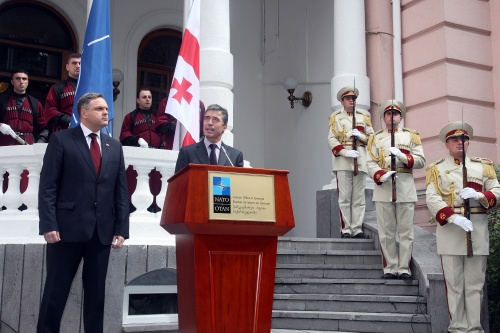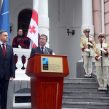
NATO Secretary-General Pays Unedifying Visit To Georgia
Publication: Eurasia Daily Monitor Volume: 7 Issue: 179
By:

Thirteen months into his tenure, NATO Secretary-General Anders Fogh Rasmussen travelled to Georgia, the number one troop-contributing country on a per capita basis to NATO’s mission in Afghanistan. Rasmussen’s October 1 visit coincided with the death of four Georgians (a colonel and three NCOs) in combat in Afghanistan’s Helmand province. Georgia is among the few countries that operate without “national caveats” — the manifold restrictions introduced by most NATO allies to avoid full-scale combat engagement in Afghanistan.
Rasmussen inaugurated the enlarged premises of a pre-existing NATO liaison office in Tbilisi, visited the Defense Ministry, conferred with President Mikheil Saakashvili and held a concluding briefing with him. Throughout the visit Rasmussen reaffirmed NATO positions on Georgia at the level of declared principles: Russia should respect the terms of the August 2008 armistice, NATO allies seek to uphold Georgia’s territorial integrity, and that the Alliance maintains its open-door policy toward membership-aspiring countries including Georgia. On this latter point, Rasmussen reaffirmed the validity of NATO’s 2008 Bucharest summit decision, according to which Georgia will become a member of NATO, conditional only on meeting the Alliance’s standards (Civil Georgia, Rustavi-2 TV, October 1).
Unsurprisingly, Russia cast its long shadow over Rasmussen’s visit. Repeatedly he emphasized NATO’s striving for a “strategic partnership” with Russia, along with a faith-based hope that such partnership would also improve Georgia’s security situation.
In a novel argument (first introduced officially in his recent Aspen Institute Rome speech —www.nato.int/cps, September 17), Rasmussen said in Tbilisi that NATO would invoke the principle of host-nation-consent regarding Russia’s military presence on Georgia’s territories. The implication is that Russian forces are stationed there illegally in the absence of Georgian consent, which is ruled out. The United States and NATO have recently developed their position on the upcoming re-negotiation with Russia of the Conventional Forces in Europe (CFE) treaty. The updated position emphasizes respect for the host-country-consent principle, applied within internationally recognized borders, regarding Russian forces in Georgia’s territories Abkhazia and South Ossetia, as well as in Moldova’s Transnistria.
The stationing of Russian forces in those territories remains (as it has been since 2001-2002) the main obstacle to ratification of the 1999-adapted CFE treaty. Massive additional force deployment in Abkhazia and South Ossetia since 2008 further complicates the re-negotiation and ratification of the CFE treaty. The US and NATO, however, currently look eager for common ground with Russia on arms control. It remains to be seen whether they will seek to enforce the host-country-consent principle in the upcoming negotiations, or alternatively seek a formula to reconcile that principle on paper with a continuing presence of Russian forces in practice.
Rasmussen’s visit has left some important questions unanswered beyond the declarative level.
On NATO’s open-door policy and how it applies to Georgia, Rasmussen mentioned neither mechanisms nor temporal horizons for implementation. The NATO-Georgia Commission, a mechanism created at the Alliance’s 2008 Bucharest summit, is dormant. Mandated to oversee the implementation of the NATO-Georgia Annual National Plans (ANPs), the Commission has not much to oversee, given the absence of conventional force modernization programs for Georgia. The US and NATO maintain an undeclared embargo (“non-approval”) on even the most basic defensive capabilities to Georgia, in deference to Russia (EDM, September 23). Training to Georgian forces is confined to counter-insurgency in expeditionary operations, rather than homeland defense. In these circumstances it is difficult to see how Georgia’s military can meet NATO membership standards. As long as the non-approval policy is maintained, it amounts practically to an indirect Russian veto on Georgia’s preparations toward membership. Meanwhile Washington and Brussels can save face by saying that there was no Russian political veto on membership as such.
Apparently, there will be no meeting of the NATO-Georgia Commission at the NATO Summit in November in Lisbon. The North Atlantic Council made this decision in advance, at its July 12 meeting. Only the three Baltic States supported holding such a session, in keeping with previous NATO practice. Rasmussen opposed holding a Commission meeting at the Lisbon summit, on the grounds that it would be "without content" (EDM, August 13). If so, that reflects NATO’s own lack of will to implement the Annual National Plans, contrasting with Georgia’s high motivation. To restore credibility, NATO must not only to reaffirm the Bucharest summit formula at the Lisbon summit, but also to make it more specific in terms of implementation. Failing this, NATO will be seen (by friend and foe) as incapable of rewarding a country which is number one troop-contributing to NATO’s top-priority operation.
In Tbilisi, Rasmussen spoke for the Alliance in praising Georgia’s efforts on the ground in Afghanistan; but did not mention the supply corridor via Georgia to that theater of operations. Moreover, there was no public reference to Georgia’s strategic value in a European context. US and NATO fixation on Afghanistan has taken the debate on Georgia out of its earlier, natural European framework. However, US and NATO policies in the South Caucasus can only operate effectively as extensions of Euro-Atlantic and European policies toward Georgia and Azerbaijan.




